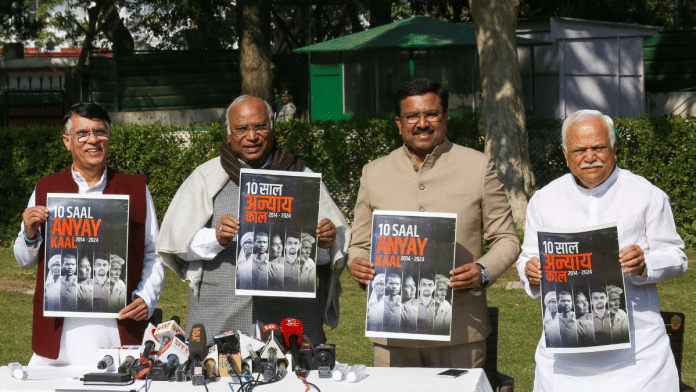New Delhi: Congress president Mallikarjun Kharge Thursday released a 54-page “black paper” which claimed that India has become an “electoral autocracy”, citing international agency V-Dem’s report from 2021.
“We are raising the main issue of unemployment, which the BJP never talks about…There is discrimination being done with non-BJP states like Kerala, Karnataka, Telangana,” Kharge said at the launch of the ‘black paper’.
“There is a danger to democracy in the country. In the last 10 years, 411 MLAs were taken on by the BJP. They toppled so many Congress governments. They are finishing democracy.”
Released ahead of the Modi government’s white paper on the state of Indian economy under the Congress rule in Parliament, the paper critiques the Modi government’s policy, politics and decisions made in its 10-year tenure.
“The inability of the once proudly independent Election Commission of India to act against blatant violations of electoral law by the ruling party is just one sign of democratic backsliding under the Modi Sarkar,” reads the paper, titled ‘10 Saal Anyay Kaal’, under the subhead, ‘India becomes an electoral autocracy’.
“V-Dem now describes India as an ‘electoral autocracy’ because of the curtailment of rights of the press, academia and civil society organisations since 2014. Freedom House ranks India as “partly free” because of the curtailment of citizens’ rights, intimidation of academia and the cancellation of FCRA licences of more than 20,000 NGOs,” it reads.
The Congress party has alleged a “de-industrialisation” of India under PM Modi, claiming that the government’s Make in India initiative is a “complete failure”.
“Contrary to the government’s PR claims, the share of manufacturing in the GDP has been falling since 2014 and hit an all-time low of 13 percent in 2022. PM Modi has initiated the ‘de-industrialization’ of India, with the share of manufacturing in employment dropping from 12.6 percent in 2011-12 to just 11.6 percent in 2021-22,” notes the paper. “From 2011-12 to 2022, the total number of workers in manufacturing was stagnant…”
‘Three anyays’
Among other topics, the ‘black paper’ discusses issues ranging from the Manipur conflict, unemployment to government policies and “systematically targeting (of) religious minorities” by the Modi government. It is broadly divided into three ‘anyays’, or injustices — economic, social and political.
Under the banner of ‘social injustice’, the party has demanded that in the Economically Weaker Section (EWS) quota for the poor from general castes should also include OBCs, SCs and STs.
“OBC reservation needs to be rationalised with empirical data to ensure proper representation,” it says in line with the Congress’s demand for a caste census. The Modi government-led “reckless privatisation” of PSUs is a “death knell” for the Scheduled Caste and Scheduled Tribes communities, it adds.
“As a result of sale and downsizing, the number of people working in PSUs between 2013 and 2022 has fallen from 17.3 lakh to 14.6 lakh. This means that 2.5 lakh jobs reserved for these disadvantaged groups have been eliminated. Similarly, 18 lakh people were employed in Railways in 2014 but the number has reduced drastically to 11 lakh people,” the paper reads.
Furthermore, the rising education levels among SC, ST, and OBC communities are crucial in addressing these employment disparities. As these groups gain more qualifications, the potential for improved job opportunities increases, yet challenges remain in translating education into meaningful employment.
“The privatisation of health and education is further reducing job opportunities for SC, ST and OBC citizens. Parliamentary Committee scrutiny of PSU records shows that SC/ST candidates are not promoted to senior positions.”
The Congress claims that the United Progressive Alliance (UPA) had introduced reservations in public procurements from the Micro, Small and Medium Enterprises (MSME) owned by SCs and STs. “However, implementation by the Modi government has been lackadaisical, and not even 1 percent of the MSMEs from which goods and services are produced belong to SCs and STs.”
Elaborating on problems faced by SC and ST communities, the paper cites the suicides of postgraduate medical student Payal Tadvi and PhD scholar Rohith Vemula to allege that caste discrimination is now “institutionalised” in colleges and universities.
On the economic front, it calls out “rampant unemployment” and growing inflation in the country.
Claiming that Modi government’s policies have consistently helped its “chosen large corporate friends” through tax cuts, write-offs and favourable contracts, the paper points out a trend of “reversed structural transformation of the economy”.
“As economies mature, workers move away from low-paying farm jobs to higher paying jobs in manufacturing and services. The opposite has happened to India under Modi. Modi’s policies have forced India’s youth back into farming,” it states.
“For 15 years, young workers moved out of agriculture into manufacturing and services. The number of agricultural workers declined by 6.7 crore between 2004-05 and 2017-18. This entire progress has almost been reversed in three years. In a single year, 2019-20, even before Covid, the number of agricultural workers rose by 3.4 crore. Since 2018-19, the number of agricultural workers has gone up by 6 crore.”
Another highlighted trend is “regression” of workers from ‘stable, salaried jobs to self-employment’, which, the paper says, is a reversal of trend from the UPA era.
“Modi’s mismanagement has managed to reverse a decade of progress in job quality and stability under the UPA. From 2004 to 2017-18, more and more workers were salaried with their fraction rising from 18.5 percent to 23.5 percent. The proportion of self-employment, a euphemistic term that includes everything from pakora-sales on the street to unpaid family work, dropped consistently from 55 percent to 51 percent,” the opposition party says.
It adds that since 2017-18, India has seen a “complete reversal” and workers are falling back into daily-wage or self-employed work. “Self-employment rose from 51 percent in 2017-18 to 57 percent in 2022-23.”
(Edited by Tony Rai)






